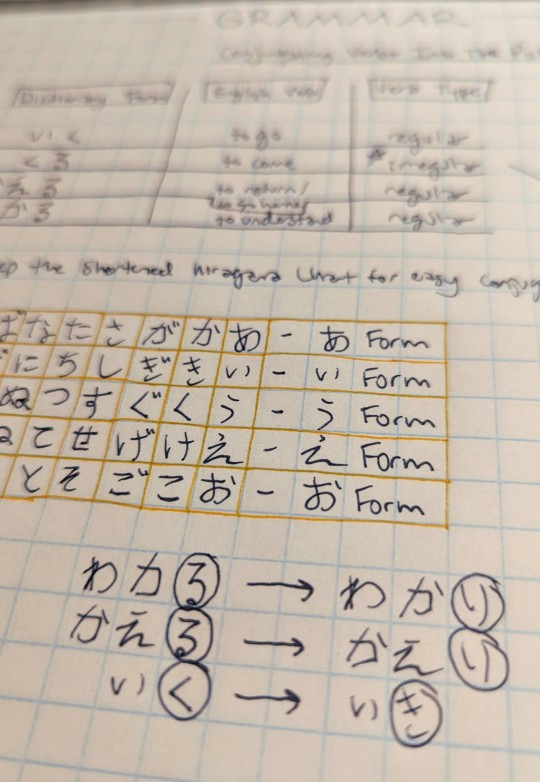#Regular Verbs
Text

こんばんわ。
it's real shitty handwriting hours ✍️
#verb conjugation#japanese verbs#regular verbs#irregular verbs#learning japanese#study#studyblr#japanese language#nihongo#hiragana#handwritten notes#langblr#writing japanese#conjugation notes#grammar notes#Japanese grammar#Japanese language notes#japanese langblr#日本語#messy handwriting#messy notes
2 notes
·
View notes
Text

0 notes
Text
The Backbone of Spanish Grammar: Regular and Irregular Verbs
Mastering Spanish Verbs
Both regular and irregular verbs are crucial in Spanish language acquisition. Regular verbs serve as foundational elements, providing predictable patterns for conjugation across various tenses and moods, facilitating comprehension and communication. They offer a structured framework for learners to build upon and are essential for expressing a wide range of actions and…

View On WordPress
#Educational Resources#Grammar Tips#Irregular verbs#Language education#Language Learning#Language Mastery#Language skills#Language Students#Language teaching#Learn Spanish#Linguistic skills#Regular Verbs#Spanish#Spanish Conjugation#Spanish grammar#Spanish language#Spanish Lessons#Spanish Studies#Spanish verbs#Verb conjugation#Verb Forms
1 note
·
View note
Link
#regular verbs#irregjlar verbs#change the spelling#english grammar#easyenglihjoy#englishtutorhub#add-d#add-ed#ed verbs
0 notes
Text
助ける (たすける) to rescue, to help
数える (かぞえる) to count
0 notes
Text
Vídeo sobre como os brasileiros estão pronunciando esses verbos completamente errados. #ingles #verbosregular
Vídeo sobre como os brasileiros estão pronunciando esses verbos completamente errados. #ingles #verbosregular

View On WordPress
0 notes
Text
oh good the teacher has emailed me and it is not the teacher who knows me, so I am going to have to explain both the pronouns and the 'unfortunately I have speech patterns from the sunny summer of 1203 and writing patterns from the godawful winters of idk the 16th century mostly. what do you mean no one writes it tvá anymore, how do you make it rhyme with þá??' thing. in icelandic.
#íslenskan mín er svolítið skrítið I say with a rictus grin#og ég er bara hér því að kínverskunámskeið er ekki í boði :(#can I remember One Single Idiom? can I heck.#can I give you ten synonyms for 'horse' off the top of my head and sing you a little song about them? yes#anyway. I think I will cope just fine with the course materials because it says students will begin to use irregular verbs#and I'm over here like. my friend. if they are *spelt* consistently they're more regular than anything I'm used to#but I understand the teacher wanting some evidence that I'm not going to be That Guy in her class ahead of time
12 notes
·
View notes
Text
by far my favourite thing about teaching teenagers is when i explain something about how language works and they say it's just stupid and sometimes i have no choice but to agree
9 notes
·
View notes
Text


iac sa day eleven
#ant being supportive and covering for dec's literal stumble#(this is not quite the wording i'm looking for....)#also watching dec in the first gif windmilling on a loop like that has me lmao#the links are starting to feel more like regular iac too :)#but only four more days left :(#iac sa#2023#🦊.gif#(is windmilling a verb...? if not.. it is now)
27 notes
·
View notes
Text

alien on the spanish worksheet what will he learn
3 notes
·
View notes
Text
reading about Japanese honorific verbs last night was so dizzying like once you get past the most basic polite expressions it all gets so Different from the standard textbook dictionary form & 連用形+ます。
#verb conjugations are regular...but wait!#you don't have to (and in fact cannot) conjugate for person but you may have to use a different verb altogether.#except for でござる which is fine to use regardless of person mostly. but trying to remember like when to use 申す vs 仰る and so on is#actually kind of daunting
4 notes
·
View notes
Photo

I followed this Chinese balloon for almost 200km only to realize it was bird poop
0 notes
Text
weird how have got seems like it should be a past form of "get" but in american english is actually equivalent to "have" in the present tense:
what have you got there? -> what do you have there?
i've got rhythm -> i have rhythm
you don't know what you've got till it's gone -> you don't know what you have till it's gone
while got by itself can be either a past form of "get" or a shortened form of have got with the "have" dropped:
i got you, babe -> i've got you -> i have you
i got you! -> what you say once you've caught a toddler you were chasing around saying "i'm gonna get you!" to
so got is a form of the verb "get", but when used as a past participle, it's a form of the verb "have". the past participle of "get" is not got but rather gotten (in american english). and got can only be used as a particle in have got; had got is generally not used (again, in american english; i know it works differently in, e.g., some uk dialects). so:
got: simple past of get, or a shortening of have got (present of have)
have got: present of have
have gotten: present perfect of get
*had got
had gotten: past perfect of get
i'm not sure entirely how this came to be, but i wonder if it's because of the get=acquire and have=possess senses; that is, once you acquire something, you now possess it, so to get something in the past is to have it in the present. but it's complicated by the fact that the have in have got is functioning as an auxiliary used to form a compound verb tense, rather than as the "have" that means "possess", even though the full phrase have got is equivalent to the "have" that means "possess".
#syntax#my posts#'got' feels like...the inverse of an auxiliary#you put an auxiliary next to a verb to specify a nuance (in tense or mood or whatever) about that verb#whereas you put an auxiliary next to 'got' & suddenly it's 'got' that's doing something to the auxiliary! uno reverse!#what's this? can it be...? i don't believe it! got is doing it! it's converting the auxiliary to a main verb!#and then even if the auxiliary is like 'hmm. don't like that' and leaves...#'got' continues to stand in for the main verb it turned the auxiliary into. all by itself!!! and in a different tense!!!!#and this is only possible because 1) the word 'have' is both an auxiliary and a regular degular verb#(not the case with all auxiliaries!)#and 2) one of the meanings of the regular degular verb 'have' semantically describes the state of the subject and object#once the subject 'gets' the object. so 'have' essentially corresponds to the future of 'get'#i'm trying to think of other verbs that have that relationship. live and die maybe?#die is the future of live and live is the past of die. if you die that means you once lived. if you have something that means you got it#but it doesn't really work because living isn't a one-time event the way acquiring is. and it's not as directly causal#maybe learn and know? if you use learn in the past tense it pretty much corresponds to know in the present tense#(though you can forget things you learned. but you can also lose things you acquired so i think that still works)#so let's say 'know' is an auxiliary. maybe with a meaning similar to 'can' but for the purposes of this thought experiment#let's say it functions like 'have' or 'be' in that the main verb is a participle rather than an infinitive#so 'i know swum' would essentially mean the same thing as 'i can swim'. i know swum = i learned to swim#but 'i know learned' would just mean 'i know'. and you could also drop the 'know' & just say 'i learned' & it would also mean 'i know'#idk idk idk! much 2 think about!!!!!
8 notes
·
View notes
Text
What’s your most hated verb in Spanish and why?
Mine is dar and I hate it and its stupid conjugations, it knows what it did
46 notes
·
View notes
Text
Vídeo sobre como os brasileiros estão pronunciando esses verbos completamente errados. #ingles #verbosregular
Vídeo sobre como os brasileiros estão pronunciando esses verbos completamente errados. #ingles #verbosregular

View On WordPress
0 notes